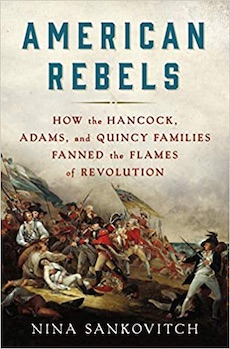By Louis J. Kern
This well-researched, popular account of members of three propertied elite families whose members became revolutionary ideologues and political activists, provides an engaging humanization of the lives of a discrete body of New England Founding Fathers. It offers glimpses into their affective lives and reveals the tribulations and contributions of the women in their lives.
Sankovitch’s exclusive focus on Massachusetts and the centrality of Puritan ideals of faith, duty, and service skews her interpretation of the Revolution and offers reinforcement to the assumption that the U.S. is a Christian country. For an alternative viewpoint, see Matthew Stewart’s Nature’s God: The Heretical Origins of the American Revolution (2014).
In accord with recent historical scholarship on the Revolution, she sees it more as a war for independence than a revolutionary movement. These men revered the English constitution and wished to preserve its rights, and they sought to establish a republic that would ensure order and preserve liberty. They reluctantly inaugurated violence and distrusted mob action. The Massachusetts seal (1775) bore the motto Ense petit placidam sub Libertate Quietam (“by the sword we seek calm peacefulness with liberty”), but omitted Algernon Sydney’s preceding words—Manus haec inimica tyrannis (“this hand an enemy to tyrants,” Discourses, 1660), thus prioritizing liberty over rebellion.
These elite men contrasted freemen and slaves, the propertied and the disentitled. Philosophically opposed to slavery, both John Hancock and Josiah Quincy III owned slaves. To ensure the stability and permanence of their republic, despite the Blacks who had fought in the Revolution, they acquiesced to the denial of liberty to people of color. John Adams did not feel that the propertyless, women, or Blacks deserved full rights and equal participation in the republic. In post-revolutionary times, Sam Adams supported the suppression of popular resistance—Shays’s Rebellion (1786-87) and the Whiskey Rebellion (1794).
Sankovitch downplays the role of Sam Adams, whom the French revered as le fameux Adams. He opposed impressment in 1748, decried the Sugar Act (1754) as taxation without representation, championed the rights of “free subjects,” and was instrumental in the development of the Committees of Correspondence in 1772. Perhaps his more humble origins and an undeserved reputation as a wild radical did not accord well with the primary subjects of this account.
Sankovitch’s tight focus minimizes the role of Tom Paine, the most effective propagandist of the Revolution, who was central to the securing of financial assistance from France. His enthusiasm for the French Revolution, his iconoclastic deism, and his marginal class status alienated him from the elite ideologues.
It became clear that the American republic saw equality as dangerously anarchic when the Federalist administration of John Adams assumed a virulent stance against the class revolution in France, effectively imposing censorship, voting restrictions, and opposition to immigrants in the Alien and Sedition Acts (1798).
This largely ideological/political account ignores the desires and struggles of the majority of the people who suffered and died for independence. For that perspective, see T.H. Breen, The Will of the People: The Revolutionary Birth of America (2019).
The idealized republic envisioned by these families was abandoned in the light of political reality; the liberating promise of the Revolution remained unrealized, equality was never approached, and liberty remains more available to some than others. Still, the words of the revolutionary generation offer condign advice in our current political climate. Sam Adams warned of “Devotion to Persons.” “Neither religion nor liberty,” he wrote, “can long subsist in the tumult of altercation and amidst the noise and violence of faction.” Heed we must if we would redeem and reclaim the promise of the Revolution.
Louis J. Kern (ΦBK, Clark University) is professor emeritus of history at Hofstra University. Hofstra University is home to the Omega of New York chapter of Phi Beta Kappa.




